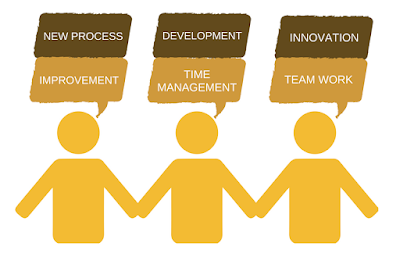When you open "the employee's suggestion box" with an open heart and especially, with an open mind, you can make your employees feel valued, therefore, their performance can reach a completely new level.
 |
| Your employees can help you to improve different processes and areas in your company |
Are you currently receiving fresh and innovative ideas?
- You have asked your employees for opinion and you have gotten no answer
- You have a suggestion list on your internal system with no marks
- Nobody comments on ways to improve performance
- In team meetings, your employees are mostly silent and agreeing in everything you say.
It is time to check why this is happening.
Corporate culture for innovation:
In many companies, suggestions seem to disappear into a dark hole. In others, employees with new ideas might be seen as an unfit for the organization. Sometimes, the company's priorities list does not include managing employees' suggestions. Or perhaps they are just "too busy" to improve.
If you want to properly use your employees' suggestion to improve your company's performance, you need a corporate culture that matches and supports it. It this is not the case at the moment, you must reboot your existing corporate culture.
Be ready, this is not an easy task.
How to work on your employees suggestions:
Evaluate your corporate culture: if you are not receiving fresh and innovative ideas and your employees remain silent when you ask for suggestion, it is time to evaluate your corporate values and rituals. Change those in a way that your new values supports the employees' suggestion experience.
Create a safe environment for suggestions and input: make sure that your employees feel free to talk about their ideas and point of views. Your employees' collaboration will be better when they feel comfortable providing input without being demeaned.
Be welcome and open for ideas: as each employee is different, you might get ideas, proposals and points of view which are different than your own. If people want to do things in different ways than your way, it does not mean that they are wrong, that they don't know how to do things or that they want to go against you. When you add different approaches to your company actions and processes, you inject richness into your company.
Be empathy: let say that your employee is sharing a solution to a problem he is facing at work but, this problem does not resonate to you, remember to put yourself in this person's shoes and try to understand his situation.
Facilitating spaces for experience sharing: I have learned so much from the professional experiences of my colleagues located in other units and regions, that I cannot recommend this experience sharing enough. The point is not to imitate the tactics that others are implementing but, to learn from them, take some inputs from the cases and perhaps, adapt and use those inputs in your own activities. Make experience sharing a regular part of your communication and processes.
Give space to the anonymous: The truth is that not everyone feels comfortable to share the own ideas, however, this does not mean that they have no ideas at all, or that their ideas are invaluable. By giving the chance to share their points of view in an anonymous way, you are getting also another set of ideas and approaches.
Focus on things that add value: positive and constructive criticism is accepted, to be negative and nasty, is not.
Prioritize: you might receive many suggestions and it might feel a bit overwhelming. Talk to your people a select those topics and actions which are more urgent. Make a priority list and go trough the cases according to the list.
Engage people in solving the problems: you don't need to be in charge of solving all people's problem. In fact, you should delegate and engage your employees in solving their issues. Making them responsible of some improvements, will make them more committed.
Follow-up tasks: work together with your employees and create clear plans and deadlines for these improvements. You can, for example, manage those as projects. In this way you can follow up and evaluate the results.
Receiving feedback and suggestion from your employees will help you to develop as a manager and especially, to develop the way your company is doing things. Remember to be open minded and make your employees part of the process. Your employees will feel that their opinions are valued and they can have an impact on changing things to better. If at the moment you are facing difficulties receiving feedback, you might need to transform your corporate culture into one that is open for employees' suggestions and feedback. For that, you need organizational commitment, clarity and ongoing communication
